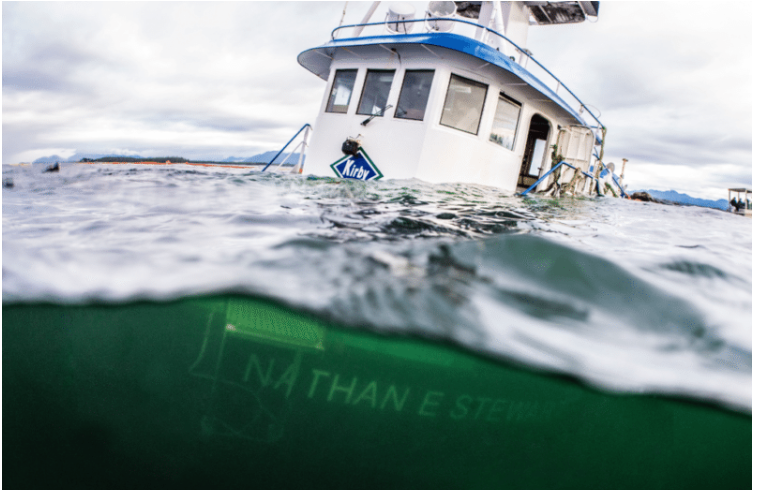Fatigue and Outdated Watch System Caused Sinking of U.S. Tug in British Columbia, Investigation Says
By Peter A. Janssen
In a new report that resonates with all of us who go cruising, the Transportation Safety Board of Canada said that fatigue, caused by the 6-on, 6-off watch system, was the major factor in the grounding and ultimate sinking of the 95-foot-long tug Nathan E. Stewart near Bella Bella, B.C. in October, 2016. The tug ran aground on Edge Reef on the Inside Passage, about 10 nm west of Bella Bella, just after 1 a.m. when the second mate, the only person on the bridge, fell asleep and missed a course change.
The tug separated from its 287-foot-long, double-hulled barge and sank eight hours after the grounding, spilling 29,000 gallons of fuel. It had been southbound on a voyage from Ketchikan, Alaska, to Vancouver, B.C. An assistant tankerman was on watch with the second mate, but he was busy with duties elsewhere on the boat at the time of the grounding.
The Canadian report echoes conclusions of an earlier U.S. report from the National Transportation Safety Board (the Nathan E. Stewart was a U.S.-flagged vessel), but it focused on the problems of fatigue and sleep deprivation. It said the second mate slept 4 ½ and 6 ½ hours on each of the three days before the accident, but he slept in the mornings, not in the evenings, when he was off watch. “As a result, at the time of the grounding, the second mate had been awake for up to 13 hours.”
The problems associated with fatigue – lack of judgment, poor reactions, difficulty in concentration – were also cited in two incidents last summer in the far Pacific when U.S. destroyers collided with merchant ships, resulting in the deaths of 17 American sailors.
The Canadian report says that although the 6-on, 6-off watch system is a long-standing practice, it “was not designed according to principles of modern sleep science.” It notes that, “Opportunities to sleep were provided, but the second mate’s inability to nap, combined with sleep-inducing conditions on the bridge, led to increased fatigue and resulted in the second mate falling asleep on watch.”
It urged the Canadian government to require watchkeepers to receive mandatory training so they can recognize and prevent the risks of fatigue. Read the full report here:
http://www.tsb.gc.ca/eng/rapports-reports/marine/2016/m16p0378/m16p0378.asp




